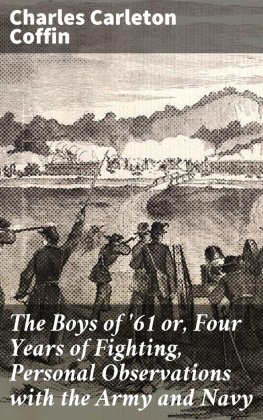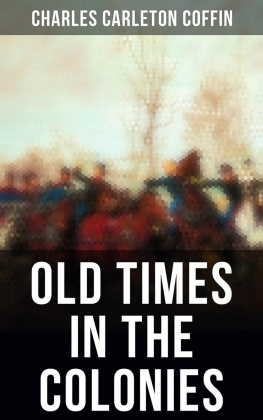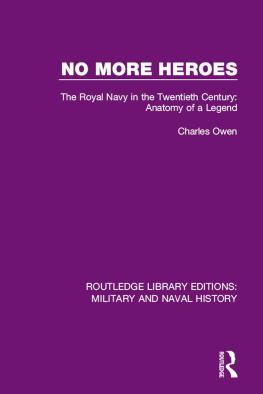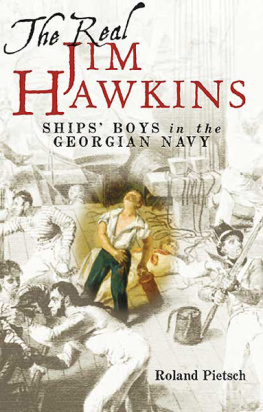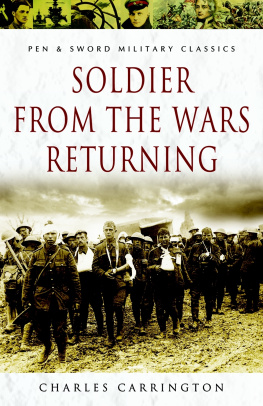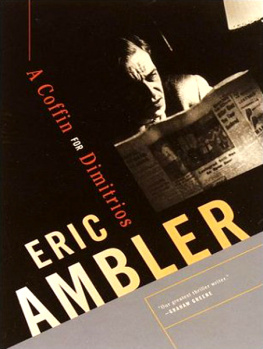INTRODUCTORY.
BEGINNING OF THE CONFLICT.
Table of Contents
June, 1861.
After four years of war our country rests in peace. The Great Rebellion has been subdued, and the power and authority of the United States government are recognized in all the States. It has been a conflict of ideas and principles. Millions of men have been in arms. Great battles have been fought. There have been deeds of sublimest heroism and exhibitions of Christian patriotism which shall stir the hearts of those who are to live in the coming ages. Men who at the beginning of the struggle were scarcely known beyond their village homes are numbered now among
"the immortal names
That were not born to die";
while the names of others who once occupied places of honor and trust, who forswore their allegiance to their country and gave themselves to do wickedly, shall be held forever in abhorrence.
It has been my privilege to accompany the armies of the Union through this mighty struggle. I was an eye-witness of the first battle at Bull Run, of Fort Donelson, Pittsburg Landing, Corinth, Island No. 10, Fort Pillow, Memphis, Antietam, Fredericksburg, Gettysburg, Fort Sumter, Wilderness, Spottsylvania, North Anna, Hanover Court-House, Cold Harbor, Petersburg, Weldon Railroad, and Five Forks. I was in Savannah soon after its occupation by Sherman on his great march to the sea, and watched his movement "northward with the sun." I walked the streets of Charleston in the hour of her deepest humiliation, and rode into Richmond on the day that the stars of the Union were thrown in triumph to the breeze above the Confederate Capitol.
It seems a dream, and yet when I turn to the numerous note-books lying before me, and read the pencilings made on the march, the battle-field, in the hospital, and by the flickering camp-fires, it is no longer a fancy or a picture of the imagination, but a reality. The scenes return. I behold once more the moving columnstheir waving bannersthe sunlight gleaming from gun-barrel and bayonetthe musket's flash and cannon's flame. I hear the drum-beat and the wild hurrah! Grant, Sherman, Sheridan, Meade, Burnside, Howard, Hancock, and Logan are leading them; while Sedgwick, Wadsworth, McPherson, Mansfield, Richardson, Rice, Baker, Wallace, Shaw, Lowell, Winthrop, Putnam, and thousands of patriots, are laying down their lives for their country. Abraham Lincoln walks the streets of Richmond, and is hailed as the Great Delivererthe ally of the Messiah!
It will be my aim in this volume to reproduce some of those scenesto give truthful narratives of events, descriptions of battles, incidents of life in camp, in the hospital, on the march, in the hour of battle on land and seawriting nothing in malice, not even towards those who have fought against the Union. I shall endeavor to give the truth of history rather than the romance; facts instead of philosophy; to make real the scenes of the mighty struggle through which we have passed.
On the 11th of June, 1861, I left Boston to become an Army Correspondent. The patriotism of the North was at flood-tide. Her drum-beat was heard in every village. Men were leaving their own affairs to serve their country. The stars and stripes waved from house-top and steeple. New York was a sea of banners. Ladies wore Union rosettes in their hair, while gentlemen's neck-ties were of "red, white, and blue." That family was poor indeed who could neither by cloth or colored tissue-paper manifest its love for the Union. The music of the streetsvocal and instrumentalwas "Hail Columbia" and "Yankee Doodle." Everywherein city and town and village, in Boston, New York, and Philadelphiathere was the same spirit manifested by old and young, of both sexes, to put down the Rebellion, cost what it might of blood and treasure.
Baltimore presented a striking contrast to the other great cities. It was dull and gloomy. The stars and stripes waved over the Eutaw House, from the American newspaper office, where the brothers Fulton maintained unswerving loyalty. A few other residents had thrown the flag to the breeze, but Secession was powerful, and darkly plotted treason. There was frequent communication with the Rebels, who were mustering at Manassas. Business was at a stand still. The pulses of trade had stopped. Merchants waited in vain for customers through the long summer day. Females, calling themselves ladies, daintily gathered up their skirts whenever they passed an officer or soldier wearing the army blue in the streets, and manifested in other ways their utmost contempt for all who supported the Union.

